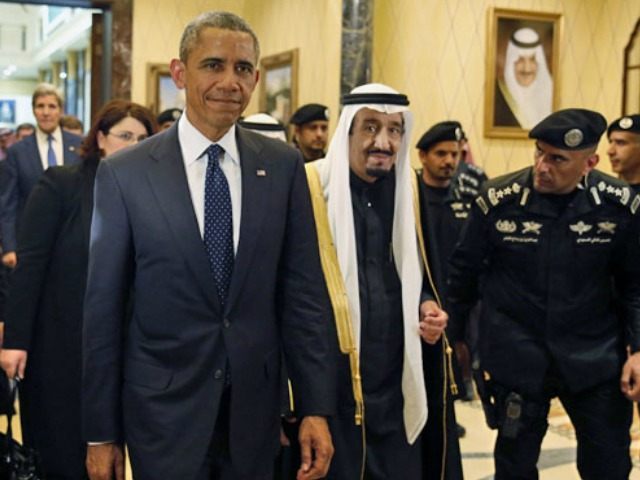Saudi Arabia and other Gulf states hit the Obama White House with a stunning vote of no confidence on Monday, as Saudi King Salman and three other regional leaders announced they would skip President Obama’s Camp David summit, scheduled for later this week.
The snub began with the Saudis, and spread to Bahrain, Oman, and the United Arab Emirates. These nations say they will still send lower-ranked representatives to Obama’s summit meeting. The Saudi snub is particularly pointed because King Salman was supposed to have a one-on-one meeting with President Obama before the summit began. A modicum of face-saving was provided by the Saudis, who cited the beginning of a humanitarian cease-fire in Yemen as the official reason their monarch would not travel to Washington.
As it stands, only the monarchs of Qatar and Kuwait still plan to attend Obama’s summit, according to the Wall Street Journal.
Fox News describes the White House as “scrambling Monday to put a positive face” on the reconfigured summit, but the scramble seems to involve Obama spokesmen looking reporters straight in the eye and denying what everyone knows: the snub is a signal of displeasure over Obama’s posture with respect to Iran and its nuclear program.
“I don’t think they have a deep respect, a deep trust for Obama and his promises,” Emirates University professor of political science Abdulkhaleq Abdullah told Fox News. “There is a fundamental difference between his vision of post-nuclear-deal Iran and their vision. They think Iran is a destabilizing force and will remain so, probably even more, if the sanctions are lifted. … They’re just not seeing things eye to eye.”
The summit is clearly still important to the Gulf states; they evidently want to send the Obama Administration a message about what they expect to hear. The Emirates’ ambassador to the United States put it plainly: “I think we are looking for some form of security guarantee, given the behavior of Iran in the region, given the rise of the extremist threat. In the past, we have survived with a gentleman’s agreement with the United States about security. I think today, we need something in writing. We need something institutionalized.”
A Saudi official added, in equally blunt fashion, that his country is looking for a defensive agreement and military hardware comparable to what the United States shares with Israel. Israel just happens to have an effective missile defense system, called Iron Dome.
“Senior Arab officials involved in organizing the meeting said not enough progress had been made in narrowing differences with Washington on issues like Iran and Syria to make the Saudi ruler’s trip worth it,” writes the Wall Street Journal. They might grow even more annoyed, and suspicious, if the White House keeps pushing its “all is well” spin to the media.
The White House apparently planned to use this summit to sell the Gulf states on the virtues of its nuclear deal with Iran, with a particularly hard sell on Obama’s favorite talking point about how a bad deal is better than no deal. The summit audience evidently wishes to let it be known they expect more than stale talking points.
Remember how President Obama’s campaign and its supporters assured us his suave, debonair, internationalist perspective would make the world love us again, after eight allegedly uncomfortable years under unilateral cowboy George W. Bush? Instead, the world’s loss of respect and trust for America under Obama is palpable. It has gotten so bad that not even Obama-friendly U.S. media can paper it over any more. In fact, that might be one of the reasons the Gulf states decided to deliver this particular message – they knew it would penetrate Obama’s media shield.
Professor Abdullah from Emirates University is further quoted on this point by the Associated Press. He told the AP that “Gulf ties with the United States remain strong, but they have been strained during Obama’s tenure,” citing recent comments by President Obama to the effect that governments like Saudi Arabia’s should quit worrying about Iran and deal with unrest at home. Those comments were clearly taken as a backhanded insult. “You just pre-empted the whole meeting with this kind of statement,” as Abdullah put it.

COMMENTS
Please let us know if you're having issues with commenting.